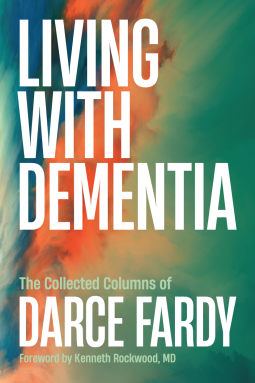
Living with Dementia
The Collected Columns of Darce Fardy
by Darce Fardy
This title was previously available on NetGalley and is now archived.
Send NetGalley books directly to your Kindle or Kindle app
1
To read on a Kindle or Kindle app, please add kindle@netgalley.com as an approved email address to receive files in your Amazon account. Click here for step-by-step instructions.
2
Also find your Kindle email address within your Amazon account, and enter it here.
Pub Date Aug 28 2024 | Archive Date Nov 15 2024
Nimbus Publishing | Nimbus Publishing Limited
Talking about this book? Use #LivingwithDementia #NetGalley. More hashtag tips!
Description
The collected columns from former reporter and head of CBC current affairs, illuminating his experience following a dementia diagnosis.
In 2013 Darce Fardy was diagnosed with dementia. He was eighty-one years old.
Fardy did not let the diagnosis get him down. Not only did he accept the situation and the likely consequences; he practically embraced them. As a former journalist, it was natural for him to document his experience. Over the next six years, almost seventy of his columns were published in the Halifax Chronicle Herald, serving as a window on his deteriorating condition.
But the columns revealed something else: the extent to which dementia touched other people's lives. Everyone seemed to have a story about a loved one who was dealing with some form of dementia—and readers were grateful for his insights.
Fardy kept writing until early 2020, when his ability to piece together a five hundred?word essay was finally out of reach. He died two years later.
Here, Fardy's columns have been compiled into a poignant and illuminating collection that serves to both honour him and destigmatize the disease. Published in cooperation with the Alzheimer Society of Nova Scotia, Living with Dementia features forty black-and-white photos, a foreword and several columns by prominent Halifax geriatrician Dr. Kenneth Rockwood, and practical guidance from the Alzheimer Society of Nova Scotia.
Royalties from the sale of Living with Dementia will be donated to the Alzheimer Society of Nova Scotia.
Available Editions
| EDITION | Paperback |
| ISBN | 9781774713365 |
| PRICE | CA$24.95 (CAD) |
| PAGES | 200 |
Links
Available on NetGalley
Featured Reviews
 Librarian 1081599
Librarian 1081599
As someone who has a family member that dealt with dementia, this was a great and helpful guide I wish I had to help cope and give me advice
 Reviewer 836475
Reviewer 836475
Well-worth the read. Dementia is one of the cruelest conditions, and most people know someone affected by it. This collection of columns by Darce Fardy after his dementia diagnosis was a very fascinating, heartbreaking, and, in some ways, optimistic glimpse into the mental state of someone with his condition over about a 6 year period.
Darce's words were very touching, and I admired his optimism and resilience as he wrote about his fears of losing memories of family and friends and of being a burden to his loved ones. I didn't plan on reading this in less than a day, but once I started reading, I found it difficult to stop.
Highly recommend.
I received a free copy of, Living with Dementia, by Darce Fardy, from the publisher and Netgalley in exchange for an honest review. Alzheimer's is a horrible robbing people of their memories. Darce Fardy was 81 when he was diagnosed with dementia, he decided to tell people, through his newspaper column, about living with dementia. This was a really interesting and honest read.
Great read to “see” through the eyes of someone with dementia and note the repetitiveness as his disease progressed. As someone with a family member with dementia it was unique to read these articles written by someone going through the experience.
 Reviewer 43423
Reviewer 43423
Darce Fardy worked for the CBC, Canada’s national broadcaster, for forty years, first as a journalist and then in management, as the head of CBC current affairs programming. After his retirement, he became Nova Scotia’s freedom of information officer. An outgoing, lively, intellectually engaged, self-described “political junkie”, he was also an optimist, and he ended up becoming an activist of sorts. In 2013, at the age of 81, he was diagnosed with Alzheimer’s Disease. His family had noticed that he was repeating himself and persistently asking questions he ought to have known the answers to. Instead of angrily denying their concerns, he saw medical professionals. Hearing the verdict, he accepted it, and rather than stubbornly clinging to his car keys, he very reasonably surrendered them and stopped driving. No pleas, no exasperated efforts to convince him, nor doctor interventions were required. He accepted his fate and fairly promptly made a pitch to the editor of the Halifax Chronicle Herald about writing a regular column about his day-to-day experience with dementia.
Darce’s larger goal was to reduce the stigma associated with the condition. Over the next six years, he wrote (his capable wife Dorothea increasingly serving an editorial role) and was well read by many Haligonians. Recognizable and approached around town, Darce relished the attention. He also received many emails, notes, and letters, in which he received words of encouragement and gratitude, as well as personal stories. (I’ll add here that Atlantic Canadians are known for their warmth, friendliness, and sense of community.)
This book is a collection of many of Darce’s columns, interspersed with others by prominent Halifax geriatrician Dr. Kenneth Rockwood, who was involved in Darce’s care early on. Darce was diagnosed in the early stages of Alzheimer’s Disease, and Rockwood observes that he was “able to comport himself well and act on his own terms more than most.” The columns’ main message was that dementia was not the end and that a good quality of life could remain for some time.
Initially Darce and Dorothea aimed to sell their home and move to a waterfront condo. However, one son and one daughter and their families lived very close by, and family stopped in daily. The couple just couldn’t do without that much-valued regular contact. They decided to make the alterations to their home that they knew would be needed. A basement bedroom and bathroom for live-in care, the relocation of the laundry room, and the installation of railings were some of the changes made.
In his columns, Darce documents his commitment to physical fitness and maintaining strength and balance. (These would inevitably fail, and his falls would be the subject of a number of his pieces.) He also volunteered for many research projects and enjoyed speaking at conferences and workshops. He was “ahead of the game” on the matter of accessibility, advocating for public spaces and homes to be better designed for an aging population increasingly likely to be diagnosed with dementia. His commitment to reading persisted for some time. Dorothea eventually would joke that he now required no more than two books. When one was done, he could turn to the already-read text and experience it as something entirely new. Of greatest importance to Darce, and the subject he returned to most of all, was the love, support, and humour of his family and friends. His early life in St. John’s Newfoundland was also regularly alluded to. As one might expect, there is some repetition, but I suspect this was not that noticeable, given that the newspaper columns appeared intermittently, not on a weekly basis.
I grew to love Darce Fardy and his family. He did, of course, eventually reach the point (a couple of years before his death) where he could no longer put together a 500-word personal essay. He died in 2022 in Halifax, his loving family surrounding him.
Readers who liked this book also liked:
Patti Callahan Henry
General Fiction (Adult), Historical Fiction, Women's Fiction
Stephen Starring Grant
Biographies & Memoirs, Nonfiction (Adult), Politics & Current Affairs
Uzma Jalaluddin
General Fiction (Adult), Multicultural Interest, Mystery & Thrillers
Jennifer Chiaverini
General Fiction (Adult), Parenting & Families, Women's Fiction


















